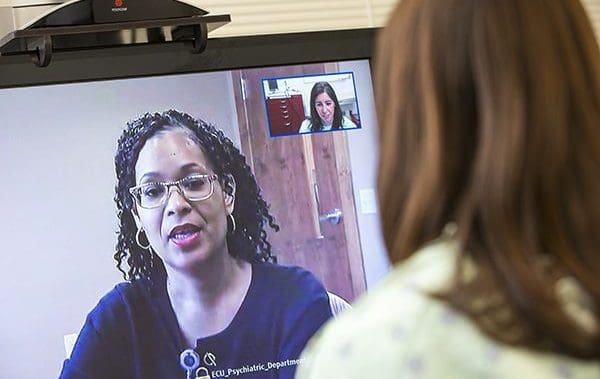
An East Carolina University team in the Brody School of Medicine’s Department of Psychiatry and Behavioral Medicine has received a $1.2 million federal grant to expand telehealth-based mental health services in North Carolina.
The grant from the Health Resources and Services Administration (HRSA) will support a project titled, “Enhancing Access, Quality and Outcomes of Mental Health Care in Emergency Departments: Expansion of the NC Statewide Telepsychiatry Program.” The project is a collaboration between ECU’s Departments of Psychiatry and Family Medicine, along with several community-based sites across the state.
“This project follows the tradition of ECU and the Brody School of Medicine of serving those who otherwise would not be served. Projects of this caliber allow us to make a difference in the lives of people not only in eastern North Carolina but across the entire state,” said Dr. Kalyan Muppavarapu, principal investigator and clinical assistant professor in the Department of Psychiatry and Behavioral Medicine.
The North Carolina Statewide Telepsychiatry Program (NC-STeP) is based at ECU and directed by Dr. Sy Saeed, professor and chair of Brody’s Department of Psychiatry and Behavioral Medicine. Established through state legislation in 2013 with $2 million in annual funding, NC-STeP is administered by the ECU Center for Telepsychiatry and E-Behavioral Health and is overseen by the Department of Health and Human Services’ Office of Rural Health.
The grant award is particularly timely because of the national call from mental health experts for preparation for the increased need for mental health services in wake of the COVID-19 pandemic. Resources were already stretched before the pandemic, a problem for which NC-STeP has provided consistent evidence-based solutions for the state.
“COVID-19 created significant challenges for patient access to care while highlighting the vulnerabilities in our current health-care system as well as the importance of using technology in reaching our patients,” Muppavarapu said. “New care delivery models have been and continue to be developed and explored; telehealth plays a significant role in removing the barriers and obstacles that have plagued rural health care for many years.”
Ninety of North Carolina’s 100 counties are designated mental health professional shortage areas, with increasing dependence on emergency rooms for acute mental health crises. NC-STeP helped establish a lifeline of telepsychiatry services by connecting rural emergency departments using videoconferencing to provide help and diminish unnecessary patient admissions to hospitals.
NC-STeP currently serves 58 emergency departments and eight community clinics. NC-STeP providers have completed more than 40,000 patient encounters via telehealth, resulting in substantial savings for the state.
The grant project aims to build on that success. The project’s over-arching objectives are to:
- expand the existing NC-STeP network to include behavioral counseling and care coordination in at least five rural hospital sites;
- to establish and implement counseling and care protocols for acute behavioral health needs and post-discharge follow-up care; and
- to explore innovative wireless telehealth access to behavioral counseling in a mobile outreach van, as a model for pre-hospital and in-route assessment and counseling and for an expanded electronic health records portal.
“This project will allow us to expand our services by embedding behavioral health counseling as well as care coordination,” Muppavarapu said. “This is a natural next step for our program as we look to build off the initial success of NC-STeP. This project connects community resources to patients who otherwise may not receive follow-up care after discharge from the emergency department.”
The expansion has potential to impact patients from children to adults, taking the program a step further into the critical transition phase following discharge from the emergency department—reducing the risk for hospital re-admission.
The project will expand access to behavioral counseling and care coordination for rural, underserved and impoverished North Carolinians, linking an estimated 600 at-risk adults and children with mental health resources. The grant will also support a planned pilot test of telehealth-based behavioral counseling services via mobile van outreach program in remote areas.
“This project provides a learning opportunity and can serve as a model to implement telehealth strategies in other health-care specialties which could have a positive impact on the health and well-being of the rural patient population,” Muppavarapu said.